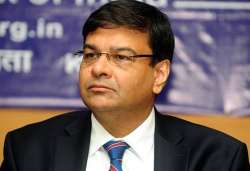Rs 9.2 lakh cr in new notes introduced after demonetisation, Urjit Patel tells Parliamentary panel
RBI has so far introduced Rs. 9.2 lakh crore in new currency after demonetisation came into effect on November 8, 2016, Governor Urjit Patel today told a Parliamentary panel today.

The Reserve Bank of India (RBI) has so far introduced Rs. 9.2 lakh crore in new currency after demonetisation came into effect on November 8, 2016, Governor Urjit Patel today told a Parliamentary panel today.
With the announcement of demonetisation by Prime Minister Narendra Modi, notes of Rs 500 and Rs 1,000 worth Rs 15.44 lakh crore were rendered useless, sparking a huge cash crunch across the country.
All over the country, the banks had to deal with huge rush of people who thronged their branches to deposit the junked notes. The deadline for depositing old notes with banks ended on December 30.
Appearing before the Parliament's Standing Committee on Finance, Patel refused to divulge how much of the demonetised currency has been deposited into banks.
Patel was deposing before the panel over demonetisation and its impact on the economy and the steps taken by the central bank to deal with the cash crunch.
He is learnt to have told the panel on demonetisation that discussions between the central bank and the government on the process began early last year.
Congress members of the committee asked questions like whose decision was it to withdraw high currency notes and also about autonomy of RBI, sources said.
BJP members of the panel, headed by former Union Minister and senior Congress leader Veerappa Moily, however, chose not to raise much questions during the meeting, they added.
The questions put up by the panel ranged from the total amount of money that came back during the demonetisation period to the total amount of new bills of Rs 500 and Rs 2,000 that were printed and sent to the banks.
It is also learnt that Manmohan Singh, one of the members who had described demonetisation as monumental management failure, too raised questions on the issue.
The Finance Ministry has sought time from the panel to provide answers to the queries raised during the meeting in which the Finance Secretary made a presentation before the committee, the sources said, adding that the members seemed not too satisfied with the replies.
The crucial meeting was held to discuss the "demonetisation of Indian currency notes of Rs 500 and Rs 1,000 and the impact thereof".
Also, representatives of Indian Banks Association (IBA), State Bank of India (SBI), Punjab National Bank (PNB) and Oriental Bank of Commerce (OBC) are scheduled to be present in the meeting.
Patel is also scheduled to appear before the Public Accounts Committee of Parliament on the same issue on January 20.
In a surprise move on November 8, Prime Minister had announced the demonetisation of old Rs 500 and Rs 1,000 notes.
Following the decision, the RBI had put restrictions on withdrawal of cash from ATMs as well as from banks to deal with shortage of new high denomination currency notes. This led to long queues at ATMs and bank branches.
The cash situation has improved gradually with supply of new Rs 500 and Rs 2,000 notes. Yesterday, the RBI increased the daily withdrawal limit from ATMs to Rs 10,000, though it kept the weekly ceiling at Rs 24,000.
